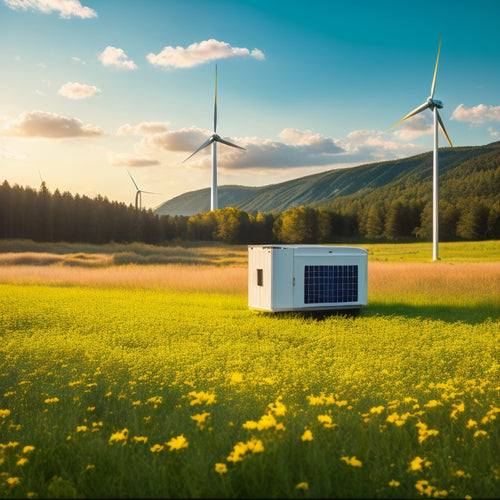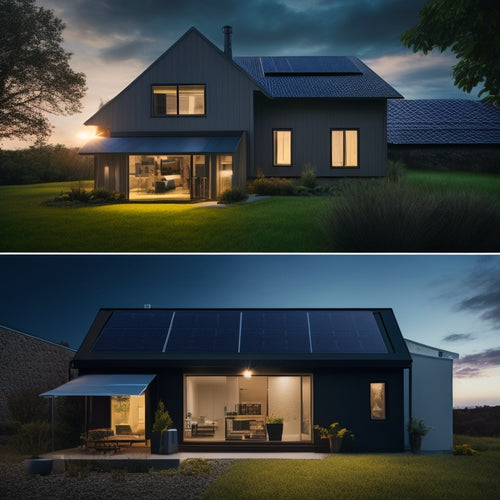
House Solar System Price
Share
You can expect to invest between $15,000 and $30,000 in a typical house solar system, which can save you up to $500 per month on energy bills and increase your property value by up to $15,000. With a house solar system, you'll generate clean energy, reducing your reliance on the grid and slashing your energy bills. You'll also enhance your property's market appeal and potentially sell your home faster and at a higher price. By understanding your daily energy consumption and selecting high-efficiency solar panels, you can maximize your system's energy output and savings. Now, take a closer look at how a house solar system can reshape your budget and lifestyle.
The Essentials
- The cost of a house solar system varies depending on the size of the system, quality of equipment, and installation company.
- A typical residential solar system can cost between $15,000 and $30,000, with savings of $100 to $500 per month on energy bills.
- High-efficiency solar panels may have a higher upfront cost but yield long-term savings, with prices ranging from $2.50 to $3.50 per watt.
- Installing a house solar system can increase property value by up to $15,000, making it a valuable long-term investment.
- Federal and state tax credits, as well as rebates, can offset installation costs, reducing the overall price of a house solar system.
Zero Energy Bills Guaranteed
You'll save money monthly on your energy bills with a house solar system, as it utilizes renewable energy from the sun to power your home.
By generating your own electricity, you'll greatly reduce or even eliminate your reliance on the grid, leading to substantial savings.
With Renewable Energy Solutions, you can break free from reliance on the grid and reduce your electricity bills, allowing you to reap considerable cost savings while taking control of your energy needs.
With a zero energy bills guarantee, you can enjoy the financial benefits of renewable energy while minimizing your carbon footprint.
Save Money Monthly
Save Money Monthly
Typically, homeowners who invest in a house solar system can greatly reduce their energy expenses, often eliminating them altogether. With a house solar system, you'll be generating your own clean energy, reducing your reliance on the grid, and slashing your energy bills. This means you can enjoy significant monthly savings, which can be a transformative factor for your budgeting strategies.
Here's a rough estimate of what you can expect:
| Monthly Energy Savings | Equivalent Monthly Expenses |
|---|---|
| $100 | 2-3 months of groceries |
| $200 | 1-2 months of mortgage payments |
| $500 | 1-2 months of car loan payments |
With these kinds of savings, you'll have more freedom to allocate your hard-earned money towards the things that matter most to you. Imagine being able to pay off debt faster, invest in your future, or simply enjoy a more comfortable lifestyle, all thanks to the power of solar energy. By investing in a house solar system, you'll be taking a significant step towards financial freedom and a more sustainable future.
Renewable Energy Source
With a house solar system, you're not only reducing your energy expenses but also switching to a renewable energy source. This change brings numerous benefits, including a significant reduction in your carbon footprint.
By utilizing solar energy, you're employing a sustainable energy solution that's clean, green, and abundant. As a result, you'll contribute less to climate change and air pollution, making your home and community a healthier place to live.
By integrating Building Integrated Photovoltaics into your home design, you can maximize energy generation and reduce your reliance on the grid.
One of the most significant solar energy benefits is its zero-emission status. Unlike traditional fossil fuels, solar energy generates electricity without releasing harmful pollutants into the atmosphere.
This eco-friendly approach provides a clear conscience, knowing you're doing your part to protect the environment for future generations.
Increases Property Value Fast
You'll find that installing a house solar system greatly enhances your property's market appeal, making it more attractive to potential buyers if you decide to sell in the future.
By incorporating renewable energy systems, such as photovoltaic cells, homeowners can showcase their commitment to eco-friendly living and energy efficiency.
This increase in appeal translates to a higher property value, as your home will stand out from others in the neighborhood.
Additionally, the solar system adds tangible assets to your property, providing a concrete benefit that appraisers and buyers can easily quantify.
Boosts Market Appeal
As homeowners consider investing in a house solar system, one notable advantage often overlooked is its substantial impact on market appeal.
You'll be pleased to know that solar panels can greatly enhance your property's marketability, making it more attractive to potential buyers. According to market trends, homes with solar systems sell faster and for higher prices compared to those without. In fact, a study found that solar-equipped homes can sell for up to $15,000 more than similar homes without solar power.
Moreover, solar incentives, such as tax credits and rebates, can offset the initial cost of installation, making it a more viable investment for homeowners.
By installing a house solar system, you're not only reducing your carbon footprint but also increasing your property's value and appeal. This means that when you decide to sell, you'll have a competitive edge in the market, attracting more buyers and driving up the sale price.
With the growing demand for sustainable living, a house solar system is an attractive feature that can set your property apart from others.
Adds Tangible Assets
Installing a house solar system instantly adds tangible assets to your property, greatly increasing its worth.
This is because a solar system is a significant addition that provides tangible benefits, making your property more attractive to potential buyers.
In fact, studies have shown that solar-powered homes sell faster and for more money than those without.
This is due to the fact that a solar system is a long-term investment that provides a high return on investment.
High-Efficiency Solar Panels Used
When you're considering a house solar system, you'll want to look for high-efficiency solar panels that maximize energy production.
These panels boast higher panel efficiency ratings, which translate to a significant energy output enhancement.
Top manufacturers like Tesla and SunPower offer high-efficiency solar panels that can increase energy production by up to 22% high-efficiency renewable energy solution.
Panel Efficiency Ratings
Most solar panels on the market today boast efficiency ratings between 15% and 20%. These ratings determine how much energy your solar panel system can generate from the sun's rays.
When considering high-efficiency solar panels, you'll notice that they often come with a higher price tag. However, they can also provide more power per hour of sunlight, which may lead to higher energy savings in the long run.
When choosing between different solar panel types, consider the installation costs and the available space on your roof. Higher-efficiency panels may allow you to generate the same amount of energy with fewer panels, which can reduce installation costs.
On the other hand, lower-efficiency panels might be more budget-friendly upfront but require more space to generate the same amount of energy.
Ultimately, the right panel efficiency rating for you depends on your energy needs, budget, and available roof space. By carefully evaluating your options, you can find the perfect balance between efficiency and cost to achieve energy independence.
Energy Output Boost
Choosing high-efficiency solar panels can greatly enhance your energy output, an essential factor in achieving energy independence. By selecting high-efficiency panels, you can maximize your energy production and reduce your reliance on the grid. This is particularly important for homeowners who want to power their homes entirely with solar energy.
High-efficiency solar panels offer several benefits, including increased energy output per unit area, reduced space requirements, and improved system maintenance. Here's a comparison of high-efficiency solar panels:
| Panel Type | Efficiency Rating | Energy Output |
|---|---|---|
| Standard | 15-17% | 250-270 watts |
| High-Efficiency | 20-22% | 320-350 watts |
| Premium | 23-25% | 400-420 watts |
As you can see, high-efficiency solar panels can produce considerably more energy per unit area than standard panels. This means you can generate more power with fewer panels, reducing the overall cost of your solar system. By choosing high-efficiency solar panels, you can elevate your energy output and move closer to achieving energy independence.
Assess Your Energy Usage
You'll need to determine your daily energy consumption to accurately assess your energy usage. This involves calculating your total kilowatt-hours (kWh) per day, which will help you size your solar system correctly.
As you investigate renewable energy for homes, consider how energy-efficient homes can reduce your energy bills. By examining your energy usage patterns, you'll identify peak usage times and understand how to optimize your solar system's performance.
Daily Energy Consumption
Daily, homeowners rely on various appliances and devices to power their lives, from refrigerators and air conditioning units to laptops and smartphones. To assess your energy usage, it's crucial to understand your daily energy consumption. This involves tracking the amount of energy each appliance uses and identifying areas for improvement. Conducting an energy consumption analysis helps you pinpoint opportunities to enhance household energy efficiency.
| Appliance | Average Daily Energy Consumption (kWh) |
|---|---|
| Refrigerator | 1.5-2.5 |
| Air Conditioning Unit | 2-5 |
| Laptop | 0.1-0.5 |
Energy Usage Patterns
Understanding your daily energy consumption is just the starting point.
Now, you need to assess your energy usage patterns to get a clearer view of your energy needs. Analyzing your energy consumption habits helps identify usage trends, such as peak hours and seasonal variations.
You can start by looking at your past utility bills to identify when you use the most energy.
Are you a morning person who turns on the lights and appliances as soon as you wake up, or do you prefer to stay up late watching TV or browsing the internet?
Do you notice a spike in energy consumption during the summer months when you're running the air conditioner more frequently?
Longer Warranty Period Offered
When you opt for a house solar system with a longer warranty period, you'll benefit from an enhanced protection guarantee.
This means you're shielded from potential losses due to defects or malfunctions, giving you peace of mind and financial security.
With a longer warranty, you're protected from unexpected repair or replacement costs, allowing you to enjoy the benefits of solar energy with confidence.
Enhanced Protection Guarantee
Take advantage of an Enhanced Protection Guarantee, which stretches the warranty period for your house solar system.
This extended warranty period provides you with added peace of mind, ensuring that your solar panel system operates at peak levels for years to come. You can enjoy the benefits of renewable energy without worrying about unexpected repair or replacement costs.
The Enhanced Protection Guarantee is a proof of the solar panel longevity and installation quality of your house solar system.
It demonstrates the manufacturer's confidence in the system's ability to perform consistently over an extended period. With this guarantee, you're protected against defects, malfunctions, and other issues that may arise during the warranty period.
Frequently Asked Questions
What Is the Average Cost of Solar Panel Installation?
You'll find the average cost of solar panel installation varies depending on solar panel types, such as monocrystalline or polycrystalline, and installation factors like roof size, angle, and local labor costs, ranging from $2.50 to $3.50 per watt.
Can I Install Solar Panels Myself to Save Money?
As you commence a DIY solar expedition, you're like a pioneer venturing into uncharted territory, seeking freedom from utility bills. However, be prepared to steer through installation challenges, ensuring a safe and efficient setup that meets local building codes.
How Long Does It Take to Install a Solar System?
You'll spend around 3-5 days installing a solar system, depending on the complexity of your roof and the type of solar panels you choose, with the installation process involving assessment, design, and installation of the panels and inverters.
Do Solar Panels Work During Power Outages or at Night?
As you break free from the grid's shackles, you'll find solar panels don't work during power outages or at night, but with solar battery storage, you'll enjoy grid independence, capturing energy when you need it most, like a lighthouse in the dark.
Are There Any Government Incentives for Solar Panel Installation?
You can benefit from government incentives for solar panel installation, such as solar tax credits, which offer a 26% credit on installation costs, and renewable energy grants, providing additional financial support for your sustainable energy shift.
Final Thoughts
You're about to access the power of a house solar system, and it's a revolutionary shift. Gone are the days of hefty energy bills, replaced by zero energy bills guaranteed. Your property value soars, thanks to high-efficiency solar panels. But it's not just about savings - it's about the environment too. Assess your energy usage and make the switch. With a longer warranty period offered, you can breathe easy. The future is bright, and it's powered by the sun.
Related Posts
-

Sustainable and Eco-Friendly Generators for a Reduced Carbon Footprint
Sustainable and eco-friendly generators are perfect for cutting your carbon footprint and increasing energy efficienc...
-

Top Portable Refrigerators for Camping Adventures
When you're camping, having a reliable portable refrigerator can make all the difference for keeping your food fresh ...
-

Cost of Home Solar Battery
You're looking to invest in a home solar battery to reduce your grid reliance, but you're curious about the cost. The...


